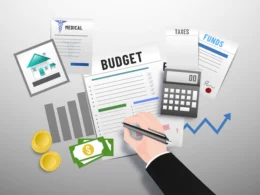When it comes to personal finance, budgeting is one of the most important things you can do to stay on track and achieve your financial goals. However, figuring out how much to budget for personal spending can be a challenge.
On one hand, you want to make sure you have enough money to cover your basic needs and enjoy your life. On the other hand, you don’t want to overspend and end up in debt.
The amount you should budget for personal spending will depend on a variety of factors, including your income, expenses, and financial goals. It’s important to take a close look at your finances and determine what you can realistically afford to spend each month.
This may involve making some tough choices and cutting back on certain expenses, but it will ultimately help you achieve greater financial stability and freedom.
In this article, you are going to discover some tips and strategies for figuring out how much to budget for personal spending and making the most of your money.
Why You Need to Budget for Personal Spending
When it comes to managing your finances, budgeting is a crucial step. A budget helps you track your expenses and ensure you’re not overspending.
Nonetheless, many people overlook the importance of budgeting for personal spending. Personal spending includes expenses that are not essential but make life more enjoyable. These might include hobbies, entertainment, or eating out.
Here are some reasons why you should budget for personal spending:
Helps You Prioritize
When you budget for personal spending, you can prioritize what matters most to you. Maybe you love going to concerts, or perhaps you prefer trying new restaurants.
Whatever your preference, allocating a specific amount of money to personal spending allows you to indulge in the things you enjoy without feeling guilty. By prioritizing what matters most to you, you can make sure your money is going towards the things that bring you the most joy.
Prevents Overspending
Without a budget for personal spending, it’s easy to overspend. You might see something you want and buy it without thinking about the consequences.
When you set a budget, you can limit your spending and avoid going into debt. It’s important to remember that personal spending should be enjoyable, not stressful. Setting a budget allows you to enjoy the things you love without worrying about the financial impact.
Encourages Savings
Budgeting for personal spending can also encourage you to save money. When you know how much money you have allocated for personal spending, you can make sure you’re not overspending and have money left over to save.
You might even find that you have more money to save than you thought. By setting a budget, you can prioritize your spending and make sure you’re saving money for your future.
Provides Insurance Against Unexpected Expenses
Finally, budgeting for personal spending can provide insurance against unexpected expenses. Life is unpredictable, and unexpected expenses can arise at any time.
If you set aside a budget for personal spending, you can make sure you have money set aside for emergencies. This can give you peace of mind knowing that you’re prepared for whatever life throws your way.
To sum up what we’ve discussed so far, budgeting for personal spending is just as important as budgeting for essential expenses. Setting a budget allows you to prioritize what matters most to you, prevent overspending, encourage savings, and provide insurance against unexpected expenses. So, take the time to create a budget for personal spending and enjoy the things you love without worrying about the financial impact.
How To Your Personal Spending Budget
Creating a personal spending budget can be a daunting task, but it is essential to ensure that you are not overspending and living within your means. Here are some steps to help you determine your personal spending budget.
Evaluate Your Income
The first step in creating a personal spending budget is to assess your income. This includes all the money you earn, including your salary, bonuses, and any other sources of income.
Make sure you calculate your net income, which is your income after taxes and other deductions. It is essential to clearly understand your income so that you can allocate your money accordingly.
Analyze Your Expenses
The next step is to evaluate your expenses. This includes all your monthly bills, such as rent/mortgage, utilities, transportation, groceries, and entertainment.
It is crucial to be honest with yourself about your expenses and to include everything. You can use a budgeting app or a spreadsheet to help you track your expenses.
Establish Your Budget
After you have evaluated your income and analyzed your expenses, it’s time to set your budget. Your budget should be based on your income and expenses, and it should be realistic.
You can use a budgeting app or a spreadsheet to help you allocate your money. Make sure you prioritize your needs over your wants and set aside some money for savings and emergencies.
Here is an example of what your budget might look like:
| Category | Monthly Budget |
|---|---|
| Housing | $1,000 |
| Utilities | $200 |
| Transportation | $300 |
| Groceries | $400 |
| Entertainment | $100 |
| Savings | $200 |
| Other Expenses | $300 |
| Total | $2,500 |
Remember, your budget should be flexible and adjustable. If you find that you’re overspending in one category, you may need to cut back in another. Also, make sure you review your budget regularly and adjust it as needed.
In summary, creating a personal spending budget is essential for financial stability and living within your means. You can achieve your financial goals and live a comfortable life by assessing your income, evaluating your expenses, and setting a realistic budget.
Tips for Sticking to Your Personal Spending Budget
Creating and sticking to a personal spending budget can be challenging, but it is essential for maintaining financial stability and achieving your financial goals. Here are some tips to help you stick to your personal spending budget:
Creating Budget Categories
To create a budget, start by listing all your monthly expenses. Categorize your expenses into necessities, wants, and savings goals. This will help you prioritize your spending and ensure that you allocate enough money to cover your essential expenses, such as rent, utilities, and groceries.
Tracking Your Spending
Tracking your spending is crucial to sticking to your budget. Use a budgeting method that works for you, such as a zero-based budget or the 50/30/20 rule. Keep track of your spending by using a budgeting app, spreadsheet, or the envelope system. Review your bank statements regularly to ensure that you are staying within your budget.
Adjusting Your Budget
Your budget should be flexible and adaptable to changes in your life. If you find that you are consistently overspending in a particular category, consider adjusting your budget lines or finding ways to reduce your expenses. Be sure to allocate some money to an emergency fund to cover unexpected expenses.
Remember to prioritize your financial goals when creating your budget. If you have debt repayment or retirement savings goals, make sure to allocate enough money to those categories. Be mindful of your spending categories and location to ensure that you are not overspending on unnecessary expenses.
In conclusion, creating and sticking to a personal spending budget requires discipline and commitment. Use the tips above to help you stay on track and achieve financial freedom. You can achieve financial stability and peace of mind by tracking your spending, adjusting your budget, and prioritizing your financial goals.
YOU SHOULD ALSO READ:










